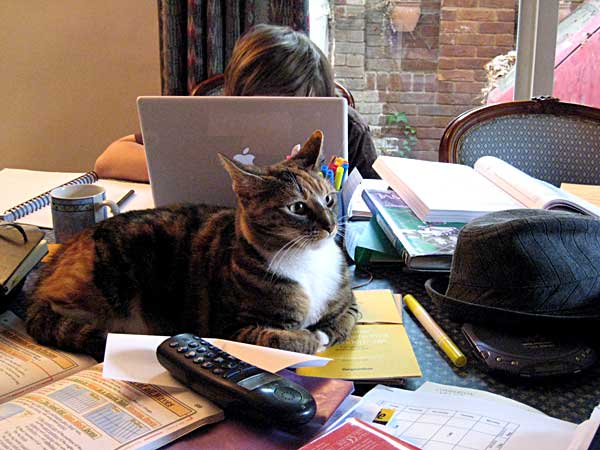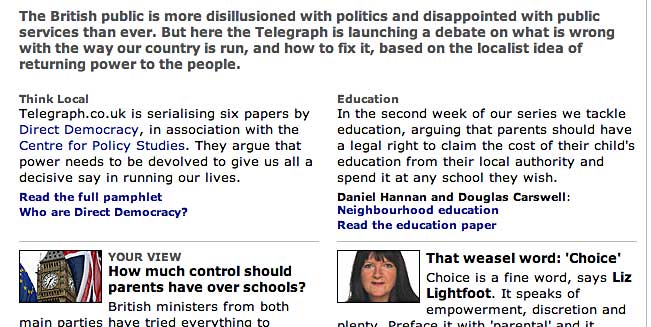
It’s exam revision time chez Naughtons and the cats are fed up with being ignored, so one of them (Tilly) has decided that if she can’t beat ’em she may as well join them.


It’s exam revision time chez Naughtons and the cats are fed up with being ignored, so one of them (Tilly) has decided that if she can’t beat ’em she may as well join them.
Good summing up…
In a matter of days Mr Ahern was transformed from a tired and dispirited leader on his way out of office into a statesman, whose skills in managing Ireland’s economic success offered just the reassurance necessary to rally undecided voters. Whether the electorate’s continued confidence in his economic stewardship is justified remains to be seen. The economy is still expanding, but less exuberantly than it was. Increasing interest rates are beginning to curb the excesses in the property market. Sharply rising personal debt levels have dented consumer confidence.
One of the most remarkable turnarounds in Ireland’s electoral politics and the greatest comeback in Fianna Fail’s election history will have repercussions for Irish politics too. The casualties are the smaller political parties, squeezed in a presidential-style campaign that was dominated by Fianna Fail and Fine Gael, which have their origins in Ireland’s civil war in 1922.
No party was more tightly squeezed than Sinn Fein. It had hoped to double its representation in the Dail to ten seats but instead lost one. In power in Northern Ireland, the party had hoped to realise its ambition to be in government both north and south of the border. It failed dismally, with its president, Gerry Adams, failing to strike a chord with southern voters, and showing little understanding of economics, or familiarity with the detail of southern politics. In the end this vote for the status quo was a vote for the Celtic Tiger, and against any change that might threaten its survival.
What’s this? Ideas in the Daily Telegraph ! Pardon me while I lie down in a darkened room.

The great merit of the Torygraph in the old days was that it was a terrific read — especially if you were interested in the more sordid kind of court case, sports and crosswords — and entirely devoid of any attempt to improve your mind. Sigh. How times change. The marmalade was thicker in those days, too. Have I told you about the Boer War, by the way…?
Thanks to Bill T for the discovery.
Well, perhaps not yet. But we’re getting there. Interesting New York Times report this morning…
The Iraq war, which for years has drawn militants from around the world, is beginning to export fighters and the tactics they have honed in the insurgency to neighboring countries and beyond, according to American, European and Middle Eastern government officials and interviews with militant leaders in Lebanon, Jordan and London.
Some of the fighters appear to be leaving as part of the waves of Iraqi refugees crossing borders that government officials acknowledge they struggle to control. But others are dispatched from Iraq for specific missions. In the Jordanian airport plot, the authorities said they believed that the bomb maker flew from Baghdad to prepare the explosives for Mr. Darsi.
Estimating the number of fighters leaving Iraq is at least as difficult as it has been to count foreign militants joining the insurgency. But early signs of an exodus are clear, and officials in the United States and the Middle East say the potential for veterans of the insurgency to spread far beyond Iraq is significant…
I have a hazy memory of George Bush explaining to an interviewer how Iraq would become a ‘turkey shoot’. He seemed to imply that if the war sucked in Al Queda from abroad then that would be a good thing because they would all be in one place and ripe for elimination by the ‘Coalition of the Willing’. My memory also records that he actually said “Bring ’em on!”
Can this be true? Perhaps I dreamt it.
Later… No I didn’t dream it. According to USA Today, 7 February, 2003,
WASHINGTON (AP) — President Bush said Wednesday that American troops under fire in Iraq aren’t about to pull out, and he challenged those tempted to attack U.S. forces, “Bring them on.”
[…]
Bush pledged to find and punish “anybody who wants to harm American troops,” and said the attacks would not weaken his resolve to restore peace and order in Iraq.
“There are some who feel like that the conditions are such that they can attack us there. My answer is bring them on,” Bush said. “We’ve got the force necessary to deal with the security situation.”
White House spokesman Ari Fleischer said Bush’s combative tone was not meant to invite attacks on Americans. “I think what the president was expressing there is his confidence in the men and women of the military to handle the military mission they still remain in the middle of,” Fleischer said.
But Sen. Frank Lautenberg, D-N.J., called the president’s language “irresponsible and inciteful.”
“I am shaking my head in disbelief,” Lautenberg said. “When I served in the Army in Europe during World War II, I never heard any military commander — let alone the commander in chief — invite enemies to attack U.S. troops.”
Rep. Dick Gephardt, D-Mo., said, “I have a message for the president: enough of the phony, macho rhetoric.”
“We should be focused on a long-term security plan that reduces the danger to our military personnel,” said Gephardt, who is running for president. “We need a serious attempt to develop a postwar plan for Iraq, and not more shoot-from-the-hip one-liners.”
Michael tells me that Answers.com is now being blocked by the Chinese authorities. Answers.com is an advertising-supported, free website which was launched in January 2005 and has become one of the leading information portals on the Internet. It claims to hold four million answers drawn from over 120 titles from brand-name publishers, original content created by Answers.com’s own editorial team, community-contributed articles from Wikipedia, and user-generated questions & answers from its proprietary WikiAnswersTM system.

Front Court, Clare College with King’s College Chapel intruding.

Michael’s desktop for most of last week. (He’s been writing device drivers.) More detail here.
Martin wonders if Jakob Neilsen has passed his sell-by date. He has.
Maplight.org is extraordinary — a database that links US legislators with their votes and the money they received from interest groups.
Consider, for example, H.R.5684 – U. S.-Oman Free Trade Agreement. This is a bill to enact a free trade agreement between the U.S. and Oman. Among the organisations lobbying for the Bill were aircraft manufacturers, pharmaceutical giants, construction companies, oil & gas companies, etc. In short, the usual suspects. Maplight reveals that legislators who voted in favour of the bill received about twice as much in contributions than those who opposed it ($163,111 to $80,856). Conversely, Representatives who voted against the bill received, on average, twice as much from lobbyists opposed to it as those who voted for. Information on campaign contributions comes from the incomparable Open Secrets site.
Money talks. When you look at the list of industries that give most to US legislators, you begin to understand how crazy intellectual property laws get passed.
Amazing thing, this Internet. I’ve just had a phone call from Anthony Holden, a good friend I haven’t seen in ages, because he’d noticed that I’d quoted him in my post about mismanagement at Channel 4. He kindly pointed out that the Chairman of that benighted channel is Luke Johnson, not Johnston (now corrected — see below). The really interesting thing, though, is that Tony — who despite being a great emailer from earliest days could never be described as geeky — is now a driving force behind a site devoted to poker, one of his abiding obsessions and a subject on which he has written a couple of good books. Not only that but one of his sons has developed Dropping Knowledge, an ingenious site devoted to “the promotion of international understanding and the promotion of art and culture”.